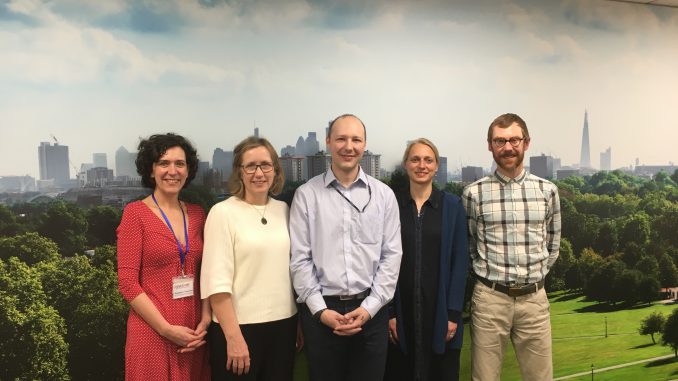
By Dr Stefan Tino Kulnik, a postdoctoral researcher at Kingston and St George’s Joint Faculty
This month, our new article has been published in the journal Design for Health. The title of the paper is ‘A gift from experience: Co-production and co-design in stroke and self-management’. We could not have achieved this publication without the support of the NIHR CLAHRC South London, which enabled us to hold a writing retreat in January 2018, during which much of the structure and content of the paper was developed.
When we talk about the gift from experience, we refer to the experience-based knowledge of people who are living with the consequences of stroke. These are insights from personal experience, tips and tricks, “What I found was helpful to me”, “What I wish I had known before”, and so on. In our article, we describe how we designed a book together with people who had a stroke, to capture their experience-based knowledge and to create a way to pass this knowledge on to others. This way of designing together is termed co-production and co-design.
We use the word “gift” to symbolise the value in what is given, as well as the value in the act of gift-giving. In this way, we address an imbalance that has been described by philosopher Miranda Fricker: The experience and knowledge of some groups (for example people living with stroke) can be afforded lesser credibility and value than the experience and knowledge of other groups (for example people who trained as healthcare professionals). The book aims to address this. It represents a forum, in which people with stroke can share and pass on their experiences and knowledge to others, feel valued in their contribution, and also benefit themselves from being part of the process.
Our paper represents a successful inter-disciplinary collaboration, which brought together four areas of expertise:
First, there is the body of work developed and led by Fiona Jones, Professor of Rehabilitation Research at the Faculty of Health, Social Care and Education at Kingston University and St George’s, University of London. Professor Jones’ research investigates how people with stroke and other long-term conditions can be supported to self-manage. Based on her research, Professor Jones has set up the successful social enterprise Bridges Self-Management Limited, which provides training and development for healthcare teams.
Second, there is the field of medical anthropology, which pays attention to social processes and cultural representations of health, illness, and associated care practices. Heide Pöstges is Director of Innovation and Training at Bridges Self-Management Limited. She uses her training in medical anthropology and sociology to explore the social space at the intersection of rehabilitation and self-management. This way of looking at things (“theoretical lens”) can help us understand how and why processes work well (or not), and how we could best go about making improvements.
Third, there is the field of communication and speech language therapy. About half of people with stroke require a communication assessment by a speech and language therapist, and a third of strokes result in a communication difficulty called aphasia, which refers to difficulty producing and/or understanding language in spoken and/or written form. It is important to make communication and information accessible to people with aphasia, which is Rosemary Townsend’s area of expertise. Rosemary is CEO of Dyscover Limited, a charity offering long-term support to people with aphasia. Rosemary’s expertise as a speech and language therapist was invaluable in the piece of work we describe in the article, as were the contributions of Chris, Deena, John and Nick, who are living with aphasia and regularly make use of the services offered at Dyscover.
Fourth, there is the field of user-led co-design. Dr Paul Micklethwaite is Director of Research in the Design School at Kingston School of Art, which is part of Kingston University. He is a design educator, researcher and practitioner and leads the MA Sustainable Design programme. Paul is an expert in co-design methods, and his expertise ties the work we describe in our article to international health policy. The WHO describes a vision of health literacy-friendly organisations, which means that the populations served (i.e. users) should be involved in the design, implementation and evaluation of health information (WHO 2013, 31-34). This brings together healthcare and design in a strategic direction that “seeks to empower individuals to make effective decisions about their own health, becoming articulate and empowered co-producers of health services.” (WHO 2015, 21). Our article gives you an example of how this vision can be realised in practice.
References
World Health Organization (WHO). 2015. WHO Global Strategy on People-Centred and Integrated Health Services: Interim Report. Geneva: World Health Organization.
World Health Organization (WHO). 2013. Health Literacy. The Solid Facts. Geneva: World Health Organization.

Leave a Reply